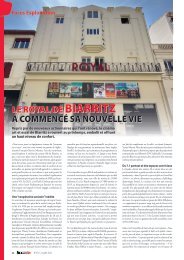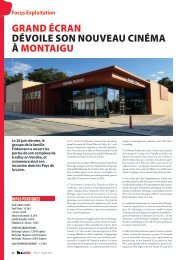Boxoffice-August.1989
You also want an ePaper? Increase the reach of your titles
YUMPU automatically turns print PDFs into web optimized ePapers that Google loves.
—<br />
OPENING CREDITS<br />
THIS<br />
ISSUE OF BoxoFFiCE marks the 51st edition of our<br />
annual buying guide to the motion picture industry.<br />
As in years past, our annual listing of distributors of<br />
theatrical films and suppliers of motion picture equipment<br />
is the most comprehensive in the industry. A quick look at<br />
these information packed pages wiW give you an impressive<br />
overview of all aspects of this business: from the suppliers<br />
of hard-to-find parts for aging projectors to the distributors<br />
of an film shorts; from back-of-seat cupholder manufacturers<br />
to the people who write software for in-theatre computer<br />
systems. But an equally quick comparison between this<br />
year's directory and last year's provides some sobering<br />
thoughts for the theatrical industry.<br />
In our listings of film distributors, for example, some<br />
familiar names no longer appear: in the last few months the<br />
industry has lost the distribution talents of Atlantic, Cannon<br />
(absorbed by Pathe), Cineplex, New World, Spectrafilm and<br />
Vestron, to name just a few. Some of the these companies<br />
folded due to a lack of return on their investment money<br />
Buying Fever<br />
who only are interested in New World's television division).<br />
Though these moves might make sense from a short term<br />
conglomerate business standpoint (all the above companies<br />
are part of or were taken over by conglomerates), we worry<br />
about the long term effects on the film industry as a whole.<br />
The conglomeration fever in our industry has now moved<br />
from the acquisition of exhibition outlets to the acquisition<br />
of production outlets, and this does not augur well for us.<br />
Just recently, George Lucas bemoaned the rash of corporate<br />
takeovers (in particular, the almost scandalous hostile<br />
Time-Wamer-Paramount takeover battle) by stating that<br />
such actions "damage the creative energies of the entertainment<br />
industry" by creating companies with enormous<br />
debts, thus tying up resources that should be made available<br />
instead for risk-taking on new films, new filmmakers, and<br />
new ideas. That is precisely what has happened to New<br />
World and Atlantic; despite what one may have thought<br />
about their film product, two voices of independent distribution<br />
have been silenced. What this means is less product<br />
for American theatre screens and, in particular, less product<br />
for the screens of American independent theatre owners.<br />
Taken alone, that is a bad sign for our industry, as more<br />
(Vestron, for example, which just couldn't come up with a<br />
major boxoffice hit after their success with "Dirty<br />
Dancing"); others were folded up as a result of sales or buyouts<br />
(Atlantic, purchased by the owners of Kartes Video Communications,<br />
was promised an infusion of money which<br />
was never forthcoming; New World Distribution has seem-<br />
and more smaller theatres are forced out of business. But<br />
worse yet is the impact on American society as a whole, of<br />
which more will be said in this space next month. Harley<br />
ingly been jettisoned by new owners Andrews Group Inc., W. Lond<br />
••••<br />
(Highest Sating)<br />
T \ }<br />
u^<br />
ptuous view of gl<<br />
Fortable theater chair. American Desit's Asl<br />
Lounger II and Astro Rocker 11 theater chai "<br />
' "^ '^<br />
AMERICAN DESK ^^

















